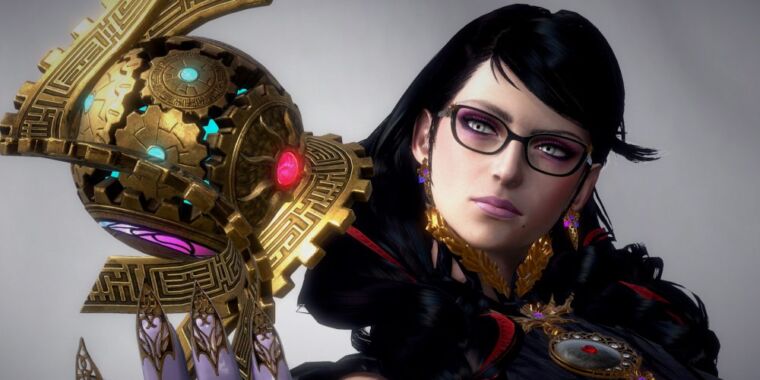Voice actress Hellena Taylor caused a bit of a social media firestorm over the weekend, calling for players to boycott the upcoming Bayonetta 3 over what she called an “insulting” and “immoral” low payment offer to reprise her role as the title character. And while reports have disputed some of the specifics of Taylor’s allegations, that he-said-she-said drama obscures just how little power video game voice actors have to demand a higher share of the revenues from bestselling titles.
The barest sliver of the pie
Earlier this month, Bayonetta 3 director Yusuke Miyata cited “various overlapping circumstances [that] made it difficult for Hellena Taylor to reprise her role,” in an interview with Game Informer. But Taylor, in an October 15 Twitter video message that has been viewed over 9 million times as of this writing, alleges that she was offered a “buyout” price of just $4,000 to once again play Bayonetta for the upcoming game. That’s a rate Taylor said was “an insult to me, the amount of time that I took to work on my talent and everything that I have given to this game and to the fans.”
“I didn’t want the world, I didn’t ask for too much. I was just asking for a decent, dignified living wage,” Taylor said, urging viewers to boycott the game and use the money to donate to charities instead. “What they did was legal, but it was immoral.”
In the days since, however, reports from both Bloomberg and VGC have cast some doubt on the specifics of Taylor’s allegations. Citing people familiar with negotiations and documentation (presumably provided by developer Platinum Games), both outlets report Taylor would have been paid $3,000 to $4,000 each for “at least” five four-hour voiceover sessions, amounting to a minimum total payment of $15,000. Taylor called those counterclaims “categorically untrue” and “an absolute lie” in responses to those outlets.
Some have also questioned Taylor’s public suggestion that the Bayonetta franchise has revenues that have “approximated $450 million (not including merchandise).” That revenue number would require at least 7.5 million sales across the series’ first two games (and that’s assuming every single copy sold for the full $60 MSRP). Yet public reports suggest the first game barely crept past a million copies sold in its opening months, and the sequel sold well under a million units as a Wii U exclusive (though a Switch re-release has sold at least a million additional copies).

I don’t want to make too little of the specific numbers being discussed here; the thousands of dollars separating the offer Taylor says she received and the one cited in press reports amounts to a pay rate difference of up to 400 percent. But those disputed details also don’t matter all that much to the bottom line here. Even the higher pay rates suggested in press reports amount to a ridiculously small portion of the kinds of revenues a game like Bayonetta 3 can bring in.
Let’s say Bayonetta 3 ends up selling just a million copies (a very conservative estimate, seeing as a years-late Switch re-release of its predecessor has already surpassed that number). Let’s also say that those copies sell for an average of $35 (which would be abnormally low given Nintendo’s general reluctance to significantly reduce the asking price of the $60 games it publishes).
Even with these restrained estimates, an upfront payment of $20,000 for voice work would amount to less than 0.06 percent of the game’s $35 million in total revenue. That’s a pretty small piece of the pie for the title character in a game that leans heavily on a distinctive voice as part of her appeal (not to mention for a trained actress with an established history in the franchise). And while the raw hourly rate someone like Taylor can receive for this kind of voice work doesn’t seem too bad, professional voice actors often struggle to make ends meet during the lengthy periods between highly competitive freelance jobs.
This kind of relatively tiny upfront payment is not out of the ordinary for gaming voice actors, either. Sean Chiplock tweeted that he only made $2,000 to $3,000 for his voice work as a number of characters on the best-selling Legend of Zelda: Breath of the Wild. And voice actor Bryan Dechart tweeted about a $4,000 offer for vocal work as “the lead character of a AAA game by a studio that has made MANY games.”
Compare that to other SAG-AFTRA members, who can earn residuals of 3.6 to 5.4 percent on “secondary” performances of theatrical releases, including DVD and digital sales or TV broadcasts. While that secondary market doesn’t have a close analogy in video games, gaming’s voice actors also don’t have anything even approximating that kind of percentage-based residual structure, which could be worth a lot of money for work on bestselling games.

